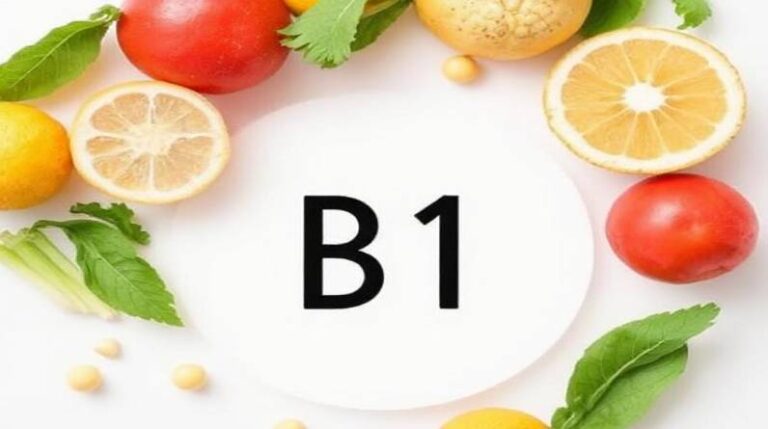Thiamine, also known as vitamin B1, is a vital water-soluble vitamin that plays a crucial role in energy production, nerve function, and overall well-being. While often overlooked, thiamine’s benefits extend far beyond preventing deficiency diseases like beriberi. Understanding how thiamine supports your body, its dietary sources, recommended intake, and who might be at risk of deficiency can help you optimize your health.
What is Thiamine?
Thiamine is one of the eight B vitamins and is essential for converting carbohydrates into energy. Unlike fat-soluble vitamins, thiamine is not stored in large amounts in the body, making regular intake necessary. Most of the thiamine in the human body exists in the form of thiamine diphosphate (TDP), a metabolically active compound that supports energy metabolism and the function of several critical enzymes.
Key Benefits of Thiamine (Vitamin B1)
1. Supports Energy Production
Thiamine is a cofactor for enzymes involved in the metabolism of carbohydrates, fats, and amino acids. These enzymes help convert food into glucose, the primary energy source for the body. Without sufficient thiamine, energy production is compromised, which can lead to fatigue, weakness, and poor physical performance.
Example: A 70 kg adult with low thiamine intake may experience early fatigue during physical activities because glucose metabolism in the muscles is inefficient.
2. Promotes Healthy Nervous System Function
The nervous system relies on thiamine to produce neurotransmitters and maintain proper nerve signaling. A deficiency in thiamine can cause nerve damage, leading to tingling sensations, numbness, and coordination problems.
Clinical relevance: Peripheral neuropathy is a common early symptom of thiamine deficiency, and it is particularly observed in people with chronic alcoholism or malabsorption disorders.
3. Supports Cardiovascular Health
Thiamine plays an essential role in maintaining heart function. Adequate thiamine helps prevent cardiovascular complications such as:
- Enlarged heart (cardiomegaly)
- Fluid retention (edema)
- Irregular heart rhythms
Table 1: Thiamine Deficiency and Cardiovascular Impact
| Condition | Description | Risk Group |
| Wet Beriberi | Causes heart enlargement, edema, and heart failure | People with chronic alcohol use, malnutrition |
| Heart Failure | Thiamine deficiency can worsen existing heart failure | Elderly, patients on diuretics |
4. Enhances Cognitive Function
Thiamine contributes to brain health by supporting glucose metabolism in neurons. Low thiamine levels have been associated with cognitive decline and neurological disorders.
- Wernicke-Korsakoff Syndrome: A severe neurological disorder caused by chronic thiamine deficiency, most common in people with alcohol dependence.
- Memory & Focus: Adequate thiamine intake supports memory retention, concentration, and mental clarity.
Example: Small studies suggest that thiamine supplementation may benefit older adults experiencing mild cognitive impairment.
5. Supports Diabetes Management
Research suggests thiamine may play a role in reducing diabetes-related complications:
- Helps regulate blood glucose levels
- Reduces the risk of diabetic neuropathy (nerve damage)
- Lowers urinary albumin excretion, a marker of kidney stress
Clinical Insight: Some studies have found that doses of 150–300 mg/day of thiamine improved glucose metabolism in patients with type 2 diabetes, although larger trials are needed.
6. Aids in Digestive and Muscle Health
Thiamine supports proper digestion by aiding enzyme activity that metabolizes carbohydrates. It also plays a role in muscle function, helping prevent weakness and fatigue.
Example: Athletes often benefit from adequate thiamine intake as it enhances energy efficiency during prolonged workouts.
7. Potential Role in Alzheimer’s and Neurological Disorders
Animal and human studies suggest thiamine deficiency may contribute to neurodegenerative diseases:
- Oxidative stress in neurons
- Plaque formation
- Reduced activity of thiamine-dependent enzymes
While preliminary research is promising, more studies are needed to confirm whether thiamine supplementation can prevent or slow Alzheimer’s disease progression.
Recommended Daily Intake of Thiamine
The Recommended Dietary Allowance (RDA) for thiamine varies by age, sex, and life stage:
| Age Group | Male (mg/day) | Female (mg/day) | Pregnancy | Lactation |
| 0–6 months | 0.2 | 0.2 | – | – |
| 7–12 months | 0.3 | 0.3 | – | – |
| 1–3 years | 0.5 | 0.5 | – | – |
| 4–8 years | 0.6 | 0.6 | – | – |
| 9–13 years | 0.9 | 0.9 | – | – |
| 14–18 years | 1.2 | 1.0 | 1.4 | 1.4 |
| 19–50 years | 1.2 | 1.1 | 1.4 | 1.4 |
| 51+ years | 1.2 | 1.1 | – | – |
Note: Pregnant and breastfeeding women require slightly higher intakes to support fetal and infant development.
Top Dietary Sources of Thiamine
| Food | Thiamine per Serving (mg) | % Daily Value |
| Fortified breakfast cereals | 1.2 | 100% |
| Pork chop, broiled (3 oz) | 0.4 | 33% |
| Trout, cooked (3 oz) | 0.4 | 33% |
| Black beans, boiled (½ cup) | 0.4 | 33% |
| Whole wheat macaroni (1 cup) | 0.2 | 17% |
| Brown rice, cooked (½ cup) | 0.2 | 17% |
| Sunflower seeds, 1 oz | 0.1 | 8% |
Tip: Cooking methods like boiling, roasting, or excessive heat can reduce thiamine content in food. Steaming and braising preserve most of the vitamin.
Thiamine Supplementation
Thiamine is available in:
- Multivitamins and B-complex supplements
- Single-ingredient thiamine tablets
- Benfotiamine, a fat-soluble derivative with higher absorption
Note: Always consult a healthcare provider before taking supplements, especially if you have underlying medical conditions or are taking medications like diuretics or chemotherapy drugs.
Who is at Risk for Thiamine Deficiency?
Certain groups are more susceptible to thiamine inadequacy:
- Chronic Alcohol Users: Ethanol reduces thiamine absorption and metabolism
- Older Adults: Low intake, multiple medications, and aging-related absorption issues
- People with Diabetes: Increased kidney clearance can reduce thiamine levels
- Bariatric Surgery Patients: Malabsorption may lead to deficiency
- HIV/AIDS Patients: Malnutrition and catabolic states increase risk
Early Warning Signs: Fatigue, irritability, poor appetite, and mental confusion
Severe Deficiency: Beriberi or Wernicke-Korsakoff syndrome
Interactions with Medications
Some medications may lower thiamine levels:
- Furosemide: A loop diuretic that increases urinary thiamine loss
- Chemotherapy (5-fluorouracil): May interfere with active thiamine metabolism
Patients taking these medications should monitor thiamine intake and consult healthcare providers about supplementation.
Key Takeaways on Thiamine Benefits
- Vital for energy metabolism, nerve, and heart health
- Supports cognitive function and may reduce risks of diabetes complications
- Found in whole grains, pork, legumes, and fortified foods
- Daily intake is essential; deficiency can have serious consequences
- Supplements can help at-risk populations, but medical guidance is recommended
Thiamine is a cornerstone nutrient that is often overlooked but critical for long-term health and well-being. Including a variety of thiamine-rich foods in your diet ensures your body has the tools it needs to maintain energy, mental clarity, and heart and nerve health.
For more insightful articles and the latest updates, keep visiting Hacoo.

